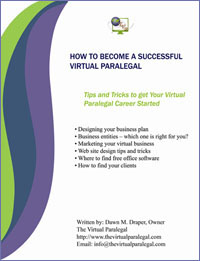The Virtual Paralegal Featured in North and South Carolina Lawyer's Weekly Magazine
Faced with layoffs, freelance paralegals reinvent themselves as business owners
By Amy Burroughs
When Tina Marie Hilton was laid off from her paralegal job in 2007, she hit the job market for a new position. But after fruitless searching, it sunk in that she wasn’t going to find one in the down economy. She still remembers the miserable weekend she sat down to make a list of her marketable skills and research employment opportunities.
One term kept popping up on her Google searches: “virtual assistant.”
“I could do that,” she remembers thinking.
Four years later, Hilton is doing exactly that, and doing it profitably. Her successful at-home business provides paralegal and website support to attorneys and other professionals around the country.
For paralegals who want to utilize their expertise and have the skills to run a business, virtual services offer a viable adaption to recession-driven layoffs. Given online tools like Skype and secure document sharing systems, Hilton believes such arrangements will only become more common.
“Everybody is trying to downsize and this is a way they can do it and do it well,” she said. “They still can have access to very knowledgeable staff.”
The freelance lifestyle is not for everyone. Some workers feel isolated at home, while others have no interest in marketing and accounting. For those who dream of a home office, however, becoming a virtual paralegal can be a way to survive and thrive.
According to the U.S. Bureau of Labor Statistics’ Occupational Outlook Handbook for 2010-2011, in-house and off-site paralegals are poised to enjoy a healthy job market. Employment of legal assistants and paralegals is expected to grow 28 percent by 2018, up from approximately 263,800 jobs in 2008. Offsetting that increase, though, will be heated competition as more people enter the profession.
Stephanie Elliott, a paralegal at Gray, Layton, Kersh, Solomon, Furr & Smith in Gastonia, N.C., said she would miss office camaraderie – not to mention benefits such as health insurance – if she worked at home. But she acknowledges that virtual services can be a solution for recession-driven layoffs.
“If you find yourself without work, you can evolve and take what you know and do something else with it,” she said. “That’s the essence of being a paralegal, is learning to roll with the punches.”
‘No Looking Back’
Before starting her business, Hilton spent several years as a full-time real estate paralegal. But when the bottom fell out of the market, her employer closed that part of his practice and she found herself out in the cold.
“Nobody was hiring,” she recalled. “After a while, it started to get scary, and then I realized, you’ve got to do something.”
Hilton thought back to her experience as a paralegal in Maine, when she often had to work from home because snowstorms made it impossible to drive to her office. Knowing she could work remotely clinched her decision, she said: “I opened my business and there was no looking back. It’s been pretty successful for me. Sometimes you have to hit the bottom before you open your eyes and see a way out.”
Hilton, who lives near Hickory, N.C., opened Clerical Advantage Virtual Assistance Services in 2007 to provide paralegal, administrative, website and social media support. She prepares documents and real estate closing packages, performs electronic filings, creates blog posts and websites, and designs PowerPoint presentations, to name a few of her projects.
Four years in, Hilton is well versed in the pros and cons of running a business. While calling the shots sounds like a dream job, being your own boss can be stressful.
“You always feel like you’re a client or two away from being in that dark place again,” Hilton said, even though she has about 25 active clients and has worked with 80. Located from California to Washington, D.C., most of Hilton’s clients have never met her in person.
One of her clients is Chris Tymchuck, who practices family law and estate planning in Minnesota. Before opening her practice, Tymchuck worked in a large firm with a full-time assistant, but said she has not missed that support. A new business owner herself, Tymchuck likes paying for help only when she needs it.
“You don’t have to commit to a specific salary or paying somebody and worry about bringing in income for that,” she said. “I guess the trade-off is that clearly, you’re not only person [Hilton] works for. You might not be her first priority that day, but I’ve never had something I couldn’t get back in the time I wanted.”
For people savvy about virtual tools, Tymchuck said there are definite advantages to using a virtual assistant. “I highly recommend that solo or small firms consider it,” she said.
Hilton agreed that many clients hire her because they don’t have to pay for office space, equipment, payroll taxes or workers comp. Dawn Draper, a virtual paralegal in Michigan, promotes those savings on her website with a chart comparing in-house versus virtual staff costs.
“You’re not paying for me to go on vacation or do anything but the time I spend on your project,” Draper said.
Despite that argument, a new virtual paralegal often encounters skepticism.
“That can be a challenge when you’re first starting out, is trying to get people to understand what it is you do and the fact that you’re not one of these people from overseas that are $4 an hour,” Hilton said. “You come with experience and expertise and it is going to cost them something, but they’re really going to get a good return on their investment.”
Also challenging are the distractions – and loneliness – of working at home. To overcome the lack of camaraderie, Hilton occasionally works at coffee shops and has weekly phone sessions with a “business buddy.”
For Hilton, another hurdle was her reluctance to promote herself. She took advantage of her social media skills to blog and tweet her way to a steady clientele, but she still had to sell her services.
“You have to get past that thing where you’re afraid to toot your own horn,” she said.
As for income, Hilton said that while it took a couple of years to regain her full-time income, her business was self-supporting within a year and covering all her bills.
“A lot of people think it’s an easy business because if you have a computer at home and you have the know-how, it is a low-cost startup,” she said. “But it’s still a business and it still requires time, energy and money to build.”
Hilton’s current project is creating Virtual Assistant Survival School, a three-part online course for people who want to start similar businesses; she hopes to launch before year-end.
‘Not for Everybody’
For paralegals who have invested 10 or 20 years in developing their expertise, finding a way to use those skills is often more appealing than starting over in a new field, said Elliott, who is president of the North Carolina Paralegal Association and an instructor at the University of North Carolina-Charlotte.
“You have to reinvent yourself,” Elliott said. “I think [the increase in virtual businesses] is the result of evolution and people needing to continue doing the same type of work, but in a different way.”
Elliott herself, however, prefers going to an office and working in person with her attorney, coworkers and clients.
“It’s not for everybody,” she said. “I’ve known people who thought they could do it, but they couldn’t make a go of it because they didn’t want to be a collection agency, they weren’t organized enough, they couldn’t work from home because there were too many distractions.”
Alyssa Mozingo of RDU Paralegal in Raleigh, N.C., also prefers in-house work. When Mozingo’s full-time position was eliminated in late 2008, it was a rude awakening: “When I first started working in the legal field, I thought ‘This is recession-proof. Our jobs are always going to be secure.’ I never thought that would happen to me, but it does, unfortunately.”
For the first several months after her layoff, Mozingo worked for a former employer on a contract basis and gradually picked up more assignments. Contract work may be full- or part-time and last for varying lengths of time, but the worker is not an employee and does not receive benefits.
Mozingo now provides on-site and remote services through her business, RDU Paralegal. While she has enjoyed many of her assignments, she still has her eye set on a full-time permanent position.
‘The Freedom to Choose’
Draper, on the other hand, said the perks of freelancing outweigh the drawbacks. After more than 12 years as a full-time paralegal, she found herself unemployed about three years ago. Today, she works for 17 attorneys and a handful of other professionals across the U.S. through The Virtual Paralegal, which she runs from her home in Traverse City, Michigan.
Before launching, Draper spent about six months researching, designing her website, improving its search engine optimization and marketing online. Business came slowly, but surely.
“I can do everything I could do in your office except file,” she said. “I could actually attend court with you over webcam if you really wanted me to.”
At least three of Draper’s clients have their own virtual practices, but she has been hired by large-firm attorneys who lack funding for a full-time assistant. Though she has clients from coast to coast, including one in South Carolina, she has never met a single one.
For Draper, the best part of self-employment is being able to work anywhere. That means in the summer, you can often find her – and her laptop – on her 23-foot power boat.
“The biggest thing to me is the ability to have the freedom to choose the work that you want to do, and where you want to work, and how long you want to work,” she said.
The flip side is that it takes extreme organization to support so many clients in so many jurisdictions. Just as each state has its own legal requirements, each attorney wants documents in a certain font size with specific margins. Draper uses spreadsheets to keep track of it all.
Even though Draper works fewer than 40 hours per week, she said her income is better now because her hourly rate is higher. According to Draper, $35 to $40 is a typical hourly fee, with some virtual assistants charging up to $65 per hour.
“There’s no way I would have made that much working for an attorney,” she said.
Both Hilton and Draper recommend that a paralegal have two to five years of in-house experience before embarking on a virtual career.
“You really need to know what you’re doing,” Draper said. “These attorneys don’t expect anything different from me as they would hiring somebody in an office.”
Menu
- Home
- Experience
- Services
- Cost Comparison
- Articles
- Testimonials
- Contact
- Virtual Paralegal EBook
- Free Office Software
- Free Legal Forms and Legal Sources
Services Overview
- Legal document preparation (All jurisdictions)
- Legal research
- Deposition summarization
- PowerPoint presentations
- Draft correspondence
- Motions & responses
- Discovery
- E-File - CM/ECF
- Manage calendars and schedules
- Data entry services
- Digital transcription
- Transcription services
- Medical summaries
- Website Design/Logo/Blog services
- More Services
Testimonials
"Dawn has provided my solo practice with paralegal services for several years now. Her paralegal expertise is a great asset to my business." John M. LaCross
Virtual Paralegal EBook
Want to learn how to become a successful virtual paralegal? Check out our EBook.Contact Us
For more information on the services that The Virtual Paralegal can provide your business, please contact us for a free consultation.
TEL:231-680-0081
FAX: 360-343-9551
E-mail:thevirtualparalegal@gmail.com
© Copyright The Virtual Paralegal
Web Design by Dawn M. Draper




